- Home
- Edmund White
City Boy Page 12
City Boy Read online
Page 12
In my novel (just as in Eliot’s and James’s), my fortune hunter, Jimmy, is initially charming and accommodating. He once dated my Sigrid character years ago and now they take up where they left off. He weans her away from her friends—and destroys her life.
If truth be told, I’d been a little bit in love with Sigrid and we’d spent some time together, but ultimately I’d confessed to her that I was gay. I remember sitting with her on a Friday night at the Riviera Café in Sheridan Square. Armies of young gay men were marching past, loud and excited, and I wanted to join them—or make them go away. Sigrid said she would not have suspected I was gay and that it didn’t make any difference anyway. The perfect answer. Of course I knew it did make a difference. I told myself that I couldn’t afford children. And then I’d had not one but many cases of gonorrhea over the years. And then I felt claustrophobic if I spent too many evenings in a row with a woman.
I backed out of her life and she married Desmond, whom I didn’t meet till some time later. Together they had a beautiful and talented daughter who resembles tall, blond Sigrid. In my novel the marriage is a disaster, and she discovers too late that he wants only her money. In real life Sigrid might have been a German Baltic baroness, but she had no money and her marriage seems much like another and survives to this day.
The interest of the book, if there was any, was in its presentation of heterosexuals and homosexuals joined through friendship—and the conviction that certain heterosexual women had in those days that gay people were freer than they were, that we were less possessive, more adventurous, and more devoted to our friends than they were, and that friendship provided the true through-line of our lives. As Marilyn told an ex who said he wanted just to be friends, “Practically anyone can be my lover, but it’s very difficult to be my friend.” I wanted to suggest that these “advanced” ideas might serve a gay man but not a straight woman. Not that traditional marriage was much better, I wanted to argue, just not disastrously worse. In the spirit of Elizabeth Bowen, I wanted to show a modern tragedy in which there were two choices and both were bad.
I was terribly insecure about my writing. More than ever. I was waiting for the first reviews of Forgetting Elena, and when they came in, they seemed genuinely uncomprehending. I was so afraid of being silenced again, of not being allowed to go on writing for publication. No one is sincerely interested in writing a journal that will never be published—or if he or she is, it’s a sort of self-sufficiency or modesty I don’t understand. If a writer has the desire to communicate by writing and be heard, then he necessarily cares about seeing his work into print. I suppose it’s the difference between masturbation and making love—the real writer wants to touch another person. Reading the written word is participating in a dialogue in which one person is doing all the talking but in which the listening is also creative.
Yes, I wanted to reach readers but I also worried for professional reasons—I wanted to live by my pen. I wanted to be among those five hundred people in America who earn a living, even a meager one, by writing serious literature. If, as Schiller said, literature shows us what humanity would be like if it existed in a state of freedom (the author, not the characters), then I wanted to belong to that tiny minority that is genuinely free. Each time I give a reason, nevertheless, it ends up sounding too exalted; I wasn’t interested so much in making money or enjoying freedom, I wanted to survive. For me, writing was essential to survival. Again, not because I had such beautiful or intense sentiments or because my ideas were so pressing and elevated (I didn’t even have many ideas except during the five minutes every day when I took a shower), but because it was the label, writer, that mattered to me most in some primitive, essential way. To be sure, writers were far more important in the culture at large fifty years ago than they are now. Back then they were considered seers or the antennae of the race, in touch with the deep conflicts underlying our society. But even without that religion of art I still was frantic to be—and to remain—a writer. Yet I wanted to be one on my own terms. I wasn’t willing to write TV scripts or bodice rippers or go on forever doing Time-Life potted versions of science or music or history (though I continued for several years to write just such books or parts of books to feed myself). No, I wanted to write a speculative work of fiction—yes, that was it: fiction was a form of speculation, a pure experiment in As If. Of course if you’re interested in “immortality,” then you’d better be a serious novelist. Look at the bestsellers of 1920 and you won’t recognize a single title or the name of a single author.
In switching back to realism I’d somehow lost my ability to write. Or rather I’d lost my confidence. I’d turned away from the pure experience of writing Forgetting Elena (which, as Richard Howard said of Roland Barthes, was “intimate without being personal”) to the no less highbrow but somehow compromised genre of the “problem” novel (How Do We Live Now, We Who Are Androgynous?). I was no longer inhabiting the center of my sensibility; I could no longer hear a hum when I was writing well. I’d gone back to writing scenes with dialogue and action, scenes in which the point was verisimilitude; I’d stopped being Beckett and become Updike (those would be the glorified comparisons).
David Kalstone, who’d just done an interview of James Merrill for the Saturday Review, came out to visit me in San Francisco, and the first thing I did was to read him a thirty-page chapter of Like People in History. He told me it was good—and I was so grateful to him, though he and I both knew it wasn’t true. I was riddled with horrible, nearly paralyzing doubt. Sometimes I blamed my years of psychotherapy for this disease of self-questioning. In therapy, I’d learned to look at myself looking at myself and constantly interrogate my motives. So much subjectivity and second-guessing and constant scrutiny had made me inauthentic. Doubting my feelings had destroyed my inner orientation device—the only thing a writer has. Moreover, all those years of writing unproduced plays and unpublished novels had not been good for my confidence, either.
Later, in 1977, I wrote freelance for Time-Life Records a forty-page life of Anton Bruckner to go with some LPs. Bruckner was supposed to be one of the few musical geniuses in history so unsure of himself he could be talked into writing and rewriting his symphonies two and three times, constantly modifying them, sometimes for the worse. I knew I’d never be in his category, not even in terms of abjection, but I could see the resemblances. Like Bruckner I had started relatively late, received little encouragement, not emerged from the right artistic milieu. Other composers were also late bloomers, such as Janaček, but few were so indecisive, few could be talked into endless rewrites.
David’s endorsement was kind and constructive and necessary. He gave me the permission I needed to finish the book and to go on as a writer, no matter how battered I might be. Even so, once my novel was finished, it made the rounds just as Forgetting Elena had done, but this new novel was never published. I had worked on it for five years. Anne Freedgood, the first person to whom we submitted it, did accept it, but made a mingy offer. Since I was convinced it was a “mainstream” novel that was worth real money, I petulantly withdrew it and told my agent to submit it to other publishers (once again discovering belatedly that she was sending out an earlier, unrevised version). When after two years no one had taken it, I went limping back to Anne, who decided she didn’t want it after all. She argued that it was difficult, even impossible, to write a good novel about such a deeply passive character (what about Camus’s The Stranger, I wondered, or all of those masterpieces by Kafka with victims as protagonists?). Perhaps she was punishing me for having initially rejected her. Or perhaps like the other editors she was secretly alarmed by my middle-class gay characters. Low-life gays, as in the novels of John Rechy or Jean Genet or Hubert Selby, were easier to stomach since they seemed so exotic. What was hard to take was someone gay who might be in the next office or in the apartment across the hall. Although gay liberation had begun, it didn’t penetrate the literary market for nearly ten years. Later I would meet editors who’d tur
ned down Like People in History who were themselves gay and closeted but were afraid to speak up for my book. One of the most fearfully closeted gay editors, Peter Kameny, became so neurotic that he started hiding in the toilet at work. Even though he’d been among the most promising literature students his year at Harvard, the publishers finally fired him and he threw himself in front of a subway.
When eventually I realized that my novel wasn’t going to sell, I wasted another year rewriting it, but even in its newest version everyone was indifferent or allergic to it. The horror of having waited so long to be published and then achieving my goal, only to have my next book turned down flat, filled me with dread. I felt that in choosing literature as a career I’d placed all my money on a single number and it had lost.
When I made this melodramatic declaration to a friend, he said, “What else were you planning to do with your life? Be an accountant? Civil engineer?”
David Kalstone was not only the warmest and most entertaining person I knew, he was also an expert in maneuvering in the world of academics and intellectuals. If I’d say something arrogant in an essay I was showing him that was destined for print, he’d write a tiny question mark in tentative pencil in the margin, and I’d instantly eliminate the offense. We went over every word the other one wrote.
I longed to have him as my best friend forever, but I recognized that his love for me was a constant source of anguish for him. I was ready to attribute my reluctance to sleep with him to a “neurosis” on my part, an inability to become intimate with the person I liked best, but I was fed up with conversations in which I was made to feel guilty for my tastes and aversions to begin with. David, I knew, nursed hopes that if he was patient enough, I’d overcome my “hang-ups” about “intimacy.” I just wasn’t attracted to him, putting us on a collision course.
Once we got terribly drunk and I asked David if as a Jew he considered himself superior to me as a gentile. He said yes. I was surprised since I must secretly have always considered WASPs to be superior to everyone else. I knew that Jews traditionally considered themselves the chosen people, but I hadn’t suspected they actually believed in that high claim. David was an entirely secular Jew, but even he retained this in-the-bone sense of orthodox superiority. He could be humorously dismissive about the “dear Jews,” and the sobriety of his clothes, the hushed elegance of his manners, his indifference to money (except as a means of financing his summer trips to Venice), all attested to his assiduity in avoiding the caricatural image of the Jew, but nevertheless he sometimes indicated that he considered his fellow Jews to be less alcoholic, better family men, more intellectually acute, warmer, kinder, and saner than all these slightly batty and cruel and dirty gentiles running about. Of course the whole Jew/gentile paradigm seemed almost far-fetched to us as friends since our intimacy defied all categories.
Our happiness together remains one of my most vivid and fructifying memories; when we are young and literary, we often experience things in the present with a nostalgia-in-advance, but we seldom guess what we will truly prize years from now. I always placed a high value on friendship, but even I had no way of guessing back then that it was more fun to get drunk with a friend than with a lover. Love is a source of anxiety until it is a source of boredom; only friendship feeds the spirit. Love raises great expectations in us that it never satisfies; the hopes based on friendship are milder and in the present, and they exist only because they have already been rewarded. Love is a script about just a few repeated themes we have a hard time following, though we make every effort to conform to its tone. Friendship is a permis de séjour that enables us to go anywhere and do anything exactly as our whims dictate.
The last few months that I was in the Bay Area in early 1972 I lived in Stephen Orgel’s house. An ex-lover of David’s from Harvard days, Stephen embraced me as a friend because David vouched for me. With what I later discovered would be his usual generosity Stephen allowed me to stay there and drive his car for the two months he was away. I’d come home late at night driving across the Bay Bridge and head up to the Berkeley Hills where I’d enter through the little garden gate beside the Princess plant and go into the low-eaved Arts and Crafts cottage with its ceramics from the period and its big, melodramatic Victorian prints of scenes from Shakespeare.
One night a young couple who worked with me—he was a Rhodes scholar and former football player, she was a blond gymnast and talented illustrator—followed me home. They were shocked by how drunkenly I’d weaved my way across the bridge and said they were worried about my chances for survival. They wanted to have sex with me, but I wasn’t sure that I was ready for a three-way with a woman, not even such a beautiful, friendly, easygoing woman and a handsome athlete with the square-jawed face of the young Hemingway. Eventually, when we were all safely back in New York, we did try a three-way, and he and I later had a two-way, but I was always puzzled by their interest in me and by their sexual virtuosity. They were too beautiful for me. In those days we always assumed that a bisexual (especially, for some reason, a bisexual man) was really a homosexual in the closet. We would wait with amused smiles till he eventually declared his true colors, which we naturally assumed would be pink and mauve. But as I learned a decade later in Paris, the world is full of genuine bisexuals, though most of them keep a low profile, not because they’re ashamed but because everyone distrusts and fears them. Tribes have only two ways of treating interstitial members; they either make them into gods or banish them. Yet as a trend if not a reality, androgyny and bisexuality were at the time being treated by the Sunday supplements as the taste of the moment. Articles and gossip columns were full of descriptions of just such young people, but I’d never been sure they really existed.
When the Saturday Review went under and I returned to New York after less than a year, I felt that I’d missed out on the best parts of California by not driving out of town on the weekends to camp under the redwoods, or beside the hot sulfur-water pools near the Russian River, or in the Zen monastery an hour away. I’d wasted my time smoking in bars and complaining because San Francisco didn’t enjoy exactly the same advantages as New York. Older, more secure people can take pleasure almost anywhere they go, but young people like us—especially recent converts to New York—had to justify our strange, demanding, and by no means obviously rewarding religion by rejecting all other cults and sacred sites.
But God I was happy to be back in New York! I liked being able to find people on the street at two and three in the morning. I liked calling up all my friends and talking for hours on the phone. I liked the feeling that everything in New York was being observed. If I saw something strange on the street, it would end up in a cartoon in the New Yorker the following week. If the subway stalled, an article about it would be in the New York Times the next morning—and after all it was a national newspaper. If I got up in a restaurant and passed four tables on the way to the loo, there would be at least three conversations I’d be dying to join. The slightly glaucous narcissism of San Francisco had been replaced by the rabid egotism of New York.
Soon I’d stumbled into a part-time job back in New York as an editor and staff writer for the venerable hardcover quarterly Horizon. We had to think up articles of general cultural interest, but ones that wouldn’t be dated by the time they finally came out after three months of lead time. It was a good job for me, given my wide-ranging reading, but I suddenly had much less authority than before and the editors were much more hesitant before committing themselves to a story idea. With Horizon, the illustrations were as important as the text and we usually started with them. An idea could be nixed out of hand if it didn’t promise sufficient visual richness.
The most interesting story idea I thought up was to have Jan Morris write about Ibn Battuta, the late-medieval Arab traveler who traversed the whole Muslim world from Spain to China, from Turkey to Egypt and on into sub-Saharan Africa. Ibn Battuta made the trip twice—once when that world was still unified and then again decades later when it was begin
ning to fall apart. I knew that Jan Morris, in her earlier gender incarnation as a man, James Morris, a celebrated travel writer, had made the same trip herself.
Morris had just had her sex-change operation and published her autobiography, Conundrum. She came in to discuss the Ibn Battuta assignment, a hearty, middle-aged woman in a wool skirt and sensible shoes. Apparently she was back in Wales with her wife, and the two women were living together as sisters. Just the other day I read that now that civil partnership is permitted in Britain, she and her wife have married again. The English historian J. H. Plumb predicted that within a matter of minutes of arriving at the offices of Horizon, Morris would produce a cherished telegram from her son in India telling her that her plans for gender-reassignment surgery were all right by him. Right on schedule Jan pulled out the telegram. When she left my office, the woman at the next desk asked me, “Who was that?”
“Why do you ask?”
“Well, you can tell she’s a woman who really knows who she is!”
I would see Jan occasionally over the years and she always seemed fearless, hyperproductive, and a bit solitary. Once in Australia a bunch of us writers at the Adelaide Festival were ferried off to the beach, but Jan stayed behind with the bus driver to chat. Later I asked her why she’d hung back with him and she said, “He’s sort of my type.” Once in New York I asked her if she jogged to keep her figure, and she modestly touched her full breasts and said, “It’s rather hard for us older women to jog.” Usually she spoke of her latest writing project; she had a well-organized, well-stocked mind, a capacious curiosity, excellent and penetrating powers of analysis, an eye for the vivid, life-giving detail, and an easy and generous flow of words.
When I first met her at Horizon, I told her that one day at the Gotham Book Mart I’d started reading a thick old book published in the 1930s about the first sex change in history, Man into Woman. It had so hypnotized me that I’d slumped to the floor and read straight through, never going back to my office at Time-Life as lunch hour became the cocktail hour. This was the book that also inspired David Ebershoff decades later when he wrote his brilliant novel The Danish Girl. The haunting 1930s book had black-and-white snapshots of the book’s subject, the painter Lili Elbe (née Einar Wegener), before and after. In the after pictures she looked sickly and bony and nearly transparent in her cloche hat as she staggered around a garden held up by a matronly nurse. It also showed samples of her handwriting before and after, slanted letters versus round ones, and even of her painting (strong oils versus pretty pastels). She’d been so determined to become a real woman that she’d had a final operation in order to bear children—and this surgery killed her (I always wondered what the procedure could possibly have been). Her diary has heartbreaking entries of deep fear and superficial optimism. The doctor has vanished. She feels weaker and weaker, and her husband (an old family friend) attends her faithfully. Now an infection has set in…

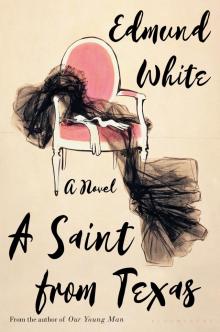 A Saint from Texas
A Saint from Texas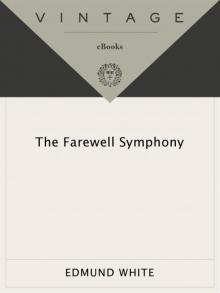 The Farewell Symphony
The Farewell Symphony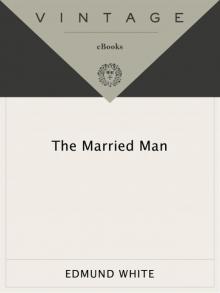 The Married Man
The Married Man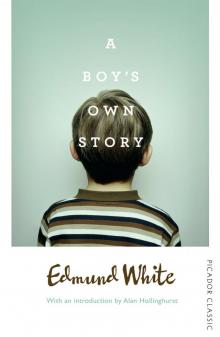 A Boy's Own Story
A Boy's Own Story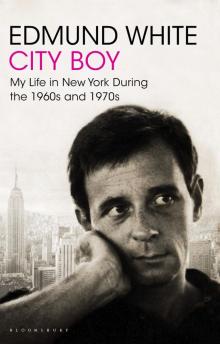 City Boy
City Boy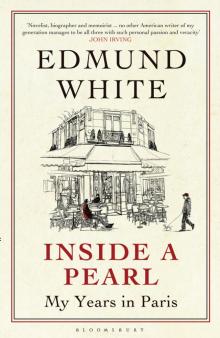 Inside a Pearl
Inside a Pearl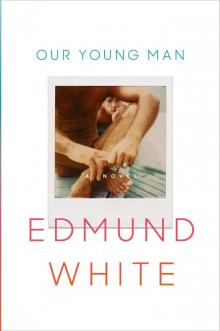 Our Young Man
Our Young Man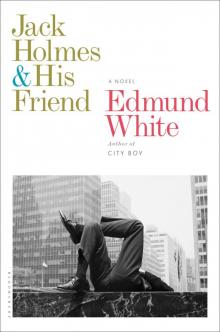 Jack Holmes and His Friend
Jack Holmes and His Friend